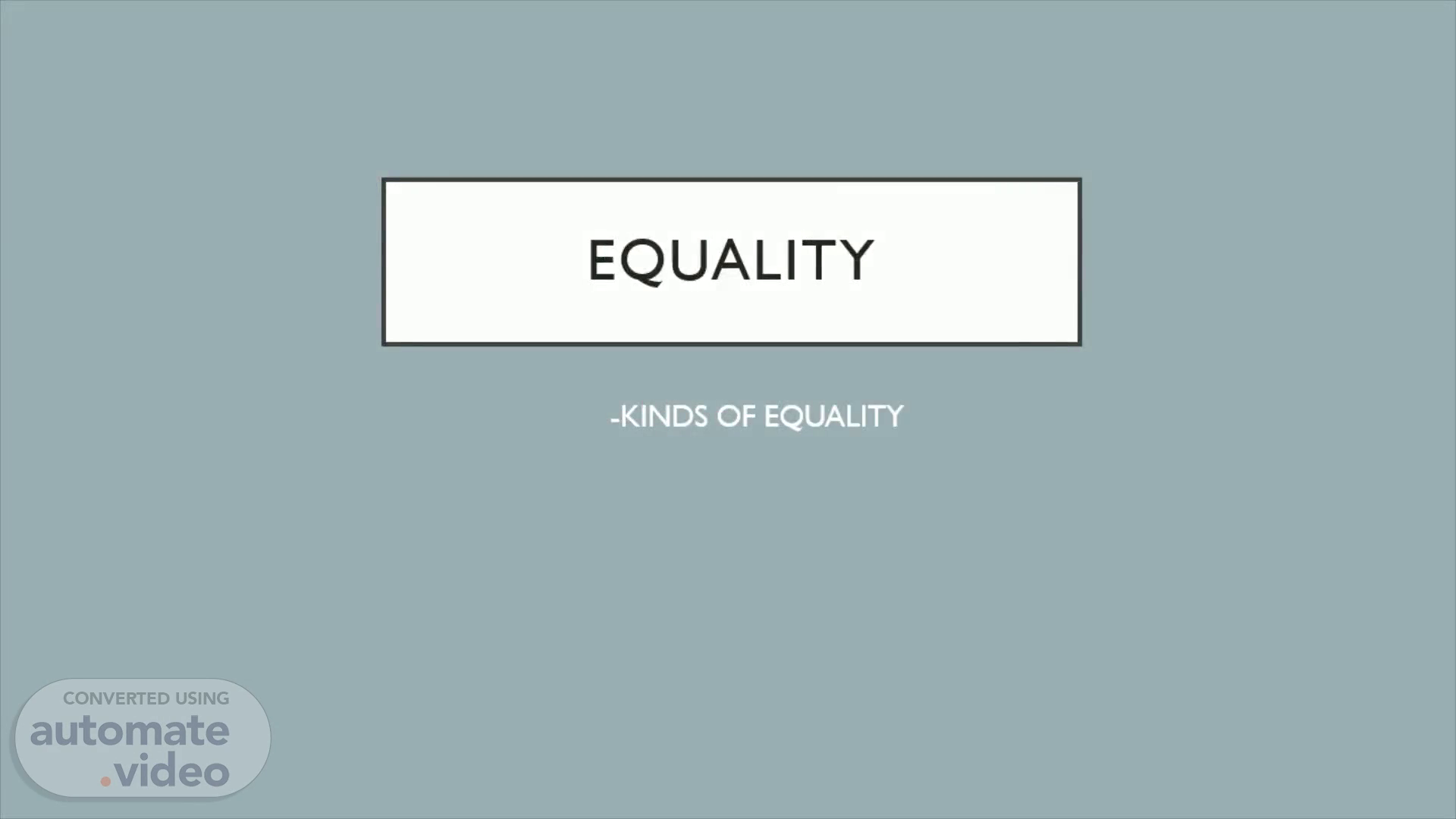Scene 1 (0s)
EQUALITY. -KINDS OF EQUALITY.
Scene 2 (7s)
EQUALITY. Equality , Generally, an ideal of uniformity in treatment or status by those in a position to affect either. Equality before the law, also known as equality under the law, equality in the eyes of the law, legal equality, or legal egalitarianism, is the principle that all people must be equally protected by the law. Article 14 of the Indian Constitution - Equality before law:- Article 14 of the Indian constitution of India provides that the state shall not deny to any person Equality before the law or the equal protection of the laws in the Territory of India. Equality before law which implies the absence of any special privileges in favour of individuals and the subject of all classes to the ordinary law and equal protection of the law which implies "Equal Treatment in Equal Circumstances The right to sue and be sued , to prosecute and be prosecuted for the same kind of action should be same for all the citizens of full age and understanding without distinction of race, religion, wealth ,social status or political influence..
Scene 3 (52s)
TYPES OF EQUALITY. dimensions of equality are: Natural Equality Social Equality Civil Equality Political Equality Economic Equality Legal Equality.
Scene 4 (1m 4s)
Natural Equality: Despite the fact that men differ in respect of their physical features, psychological traits, mental abilities and capacities, all humans are to be treated as equal humans. All are to be considered worthy of enjoying all human rights and freedoms. Social Equality : It stands for equal rights and opportunities for development for all classes of people without any discrimination. Civil Equality: It stands for the grant of equal rights and freedoms to all the people and social groups. All the people are to be treated equal before Law. Political Equality: It stands for equal opportunities for participation of all in the political process. This involves the concept of grant of equal political rights for all the citizens with some uniform qualifications for everyone. Economic Equality: Economic equality does not mean equal treatment or equal reward or equal wages for all. It stands for fair and adequate opportunities to all for work and for earning of their livelihoods. It also means that primary needs of all should be met before the special needs of few are satisfied. The gap between rich and poor should be minimum. There should be equitable distribution of wealth and resources in the society. Legal Equality: Finally, Legal Equality stands for equality before law, equal subjection of all to the same legal code and equal opportunity for all to secure legal protection of their rights and freedom. There should rule of law and laws must be equally binding foe all. In every society equality must be ensured in all these forms..
Scene 5 (2m 7s)
FEATURES OF EQUALITY. Equality does not stand for absolute equality. It accepts the presence of some natural inequalitie Equality stands for absence of all unnatural man- made inequalities and specially privileged classes in the society. Equality postulates the grant and guarantee of equal rights and freedoms to all the people. Equality implies the system of equal and adequate opportunities for all the people in society. Equality advocates an equitable and fair distribution of wealth and resources i.e. Minimum possible gap between the rich and poor. Equality accepts the principle of protective discrimination for helping the weaker sections of society. In the Indian political system, right to equality has been given to all and yet there stands incorporated provisions for granting special protection facilities and reservations to persons belonging to Scheduled Castes, Scheduled Tribes Other Backward Classes, minorities, women, and children..
Scene 6 (2m 45s)
CONCLUSION. The purpose of equality policies is to provide a level playing field and equal opportunities for all in society. The policies chief aim are to give the disabled in society the chances and support to live independently and contribute postively to their local communities. We conclude that equality means ending special rights and providing equal chances to all the citizens,thers is close relationship between the liberty and equality. There is also a close relationship between political liberty and economic liberty ,political liberty is just a fraud in the absence of economic quality..
Scene 7 (3m 11s)
DONE BY:. Aruna devi UP21G1450008.
